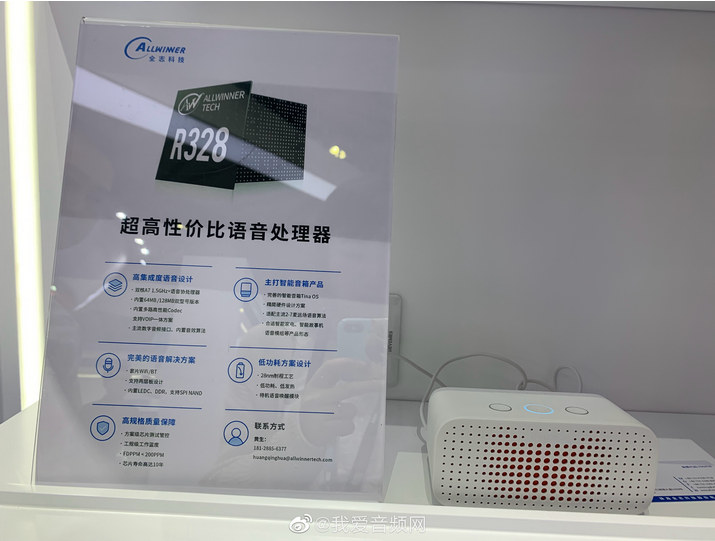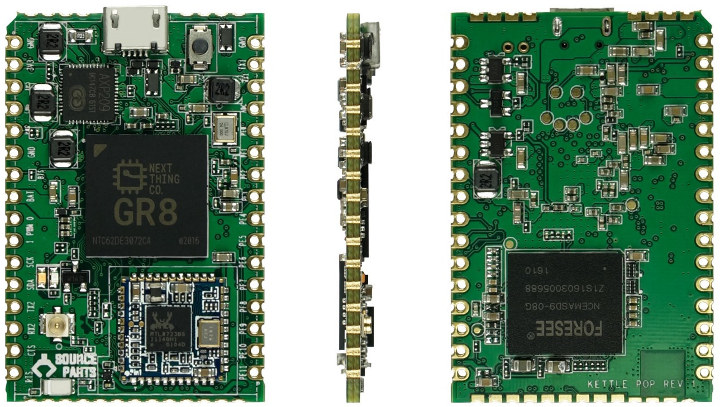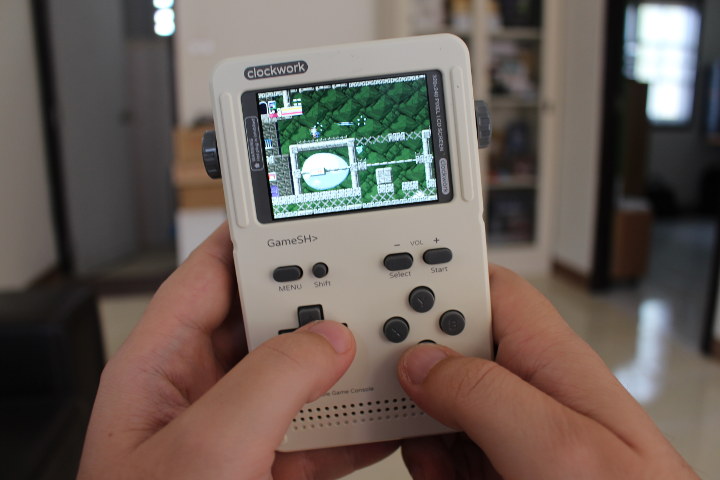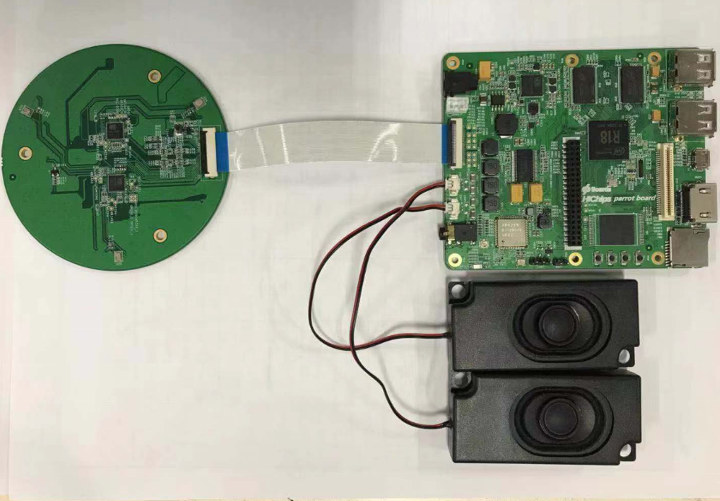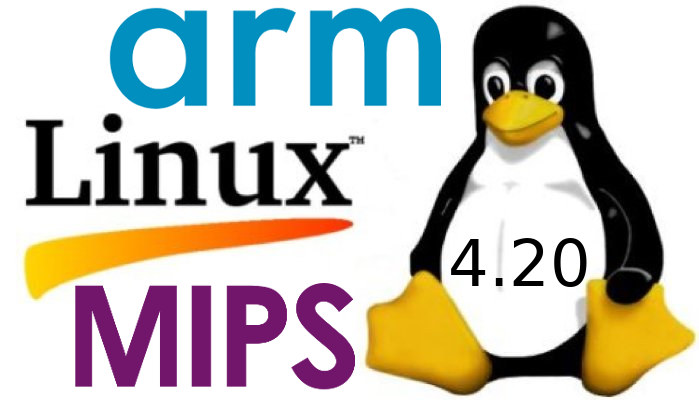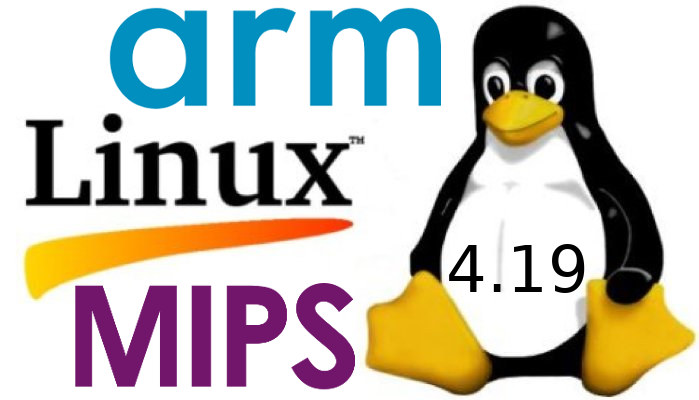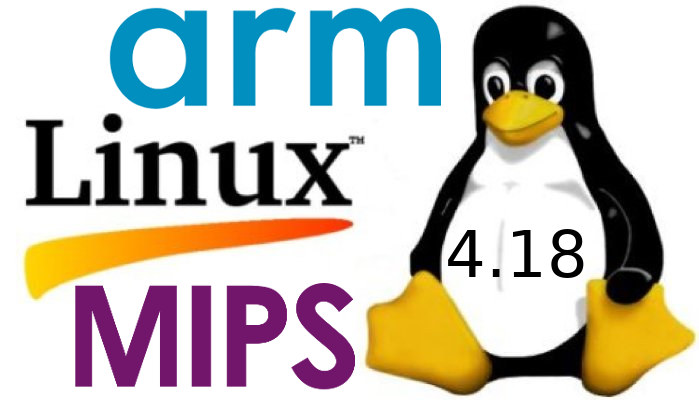Earlier this year, Allwinner introduced some AIoT (AI + IoT) processors including Allwinner R328 dual-core Cortex-A7 processor for “low-cost voice interaction solutions” aka low-cost smart speakers. I did not pay too much attention at the processor at the time, but since then, the company has released a product brief with some more details about the processor. We can see it integrates 64MB to 128MB DDR3 memory which should be enough to run Linux without external memory, and truly provide a low-cost solution for smart speakers, and I was told the chip may cost around $3. I was also asked whether Allwinner R328 smart speakers were already shipping. A Google search in English did not help, so I had to switch to Chinese, and after visiting several sites, I could see some Allwinner A328 platforms including a smart speaker and a system-on-module were showcased at some event in China. We’ve got […]
Kettlepop is a Limited Edition of a CHIP Pro Derivative with 8GB eMMC flash
Next Things Co. CHIP was a $9 Arm Linux board based on Allwinner R8 processor that become fairly popular due to its low price, built-in WiFi & Bluetooth connectivity, open source hardware design, and integration into fun kits such as PocketCHIP portable gaming console/ Linux handheld computer. Later the company expanded their product line with CHIP Pro featuring Allwinner GR8 system-in-package, and designed as a low profile system-on-module to make it more suitable for integration into commercial products. Sadly, the company eventually ran into financial problems, and had to fold later in 2018. However, later that year, a company called Source Parts announced they were working on Popcorn Computer, a derivative of C.H.I.P. board, and appears to have sold it through Amazon US for a time. But this morning, I was informed that a board called Kettlepop was added to HackerBoards database with Next Things Co. GR8 SiP, and also […]
GameShell Kit Review – Part 2: An Hackable Retro Gaming Console
ClockworkPi GameShell is an hackable retro gaming console combining Arm Linux and Arduino boards that happens to come in kit form, and that’s lot of fun to assemble as we’ve seen in the first part of the review of ClockworkPi GameShell. Since then I’ve had time to have more fun, play some games, and experiment with the device, so I’ll report my experience and point out the good parts, as well as some of the shortcomings I came across. We can press the power button to start it up, and after a few seconds we get to the main menu with several icons including… the self-describing Settings, Retro Games with MAME, MGBA, NESTOPIA, and PCxs emulators that require your own ROMs/BIOS, as well as Indie Games with ready to play games like OpenTyrian spaceship shooting game, or NyanCat. Moving on to the right of the menu we’ve got the famous […]
96Boards HiChips Parrot Board and 3-Mic Array Work with Amazon Alexa
Early last year, Banana Pi unveiled Allwinner SoC-Only 3-Mic Far-Field Development Kit for Amazon AVS, a board powered by Allwinner R18 processor extended with an external 3-mic array board, officially supported by Amazon Alexa Voice Service (AVS), and sold for $129 plus shipping. There’s now a compatible board following 96Boards CE Extended form factor, and selling for just $79.99 plus shipping on Alibaba or 555.99 CNY on 1688.com. The board looks almost the same as the original 3-Mic far-field development kit, apart from the LS and HS connectors found in the 96Boards hardware platforms. Hichips Parrot board should not be confused with Allwinner R16 based Parrot board that was used by Allwinner internally, and never made available to the general public. Hichips Parrot board specifications: SoC – Allwinner R18 quad-core Cortex-A53 processor @ 1.15GHz with Mali400MP2 GPU System Memory – 1GB DDR3 Storage – 8GB eMMC flash, micro SD card […]
ClockworkPi GameShell Review – Part 1: Unboxing & Assembly Guide
ClockworkPi Gameshell is a portable retro gaming console kit designed to be hackable being powered by Allwinner R16 processor to run Linux, as well as an Arduino compatible Atmel AVR MCU. It’s partially open source hardware with PDF schematics, and firmware source code available on Github. The device launched last year on Kickstarter, raised close to $300,000, and started shipping to backers last summer. The company has now sent me a sample for review, so let’s have a look. The first part of the review will be more than just an unboxing, since the game console is meant to be assembled by the end user, and I’ll report my experience doing so. ClockworkPi Gameshell Unboxing The kit comes in a fairly large package that reads “GameShell – Redefine Portable Game Console” and lists the main specifications with quad core Cortex A7 processor, WiFi and Bluetooth connectivity, 1GB RAM, 16GB micro […]
Linux 4.20 Release – Main Changes, Arm and MIPS Architectures
After Greg K-H handling Linux 4.19 release, Linus Torvalds is back at the helm, and released Linux 4.20 just before Christmas: Let’s face it, last week wasn’t quite as quiet as I would have hoped for, but there really doesn’t seem to be any point to delay 4.20 because everybody is already taking a break. And it’s not like there are any known issues, it’s just that the shortlog below is a bit longer than I would have wished for. Nothing screams “oh, that’s scary”, though. And as part of the “everybody is already taking a break”, I can happily report that I already have quite a few early pull requests in my inbox. I encouraged people to get it over and done with, so that people can just relax over the year-end holidays. In fact, I probably won’t start pulling for a couple of days, but otherwise let’s just […]
Linux 4.19 Release – Main Changes, Arm and MIPS Architectures
With Linus Torvalds taking a leave from the Linux kernel project, Greg Kroah-Hartman was the one to release Linux 4.19 last Sunday: Hi everyone! It’s been a long strange journey for this kernel release… While it was not the largest kernel release every by number of commits, it was larger than the last 3 releases, which is a non-trivial thing to do. After the original -rc1 bumps, things settled down on the code side and it looks like stuff came nicely together to make a solid kernel for everyone to use for a while. And given that this is going to be one of the “Long Term” kernels I end up maintaining for a few years, that’s good news for everyone. A small trickle of good bugfixes came in this week, showing that waiting an extra week was a wise choice. However odds are that linux-next is just bursting so […]
Linux 4.18 Release – Main Changes, Arm and MIPS Architecture
Linus Torvalds has just announced the release of Linux 4.18: One week late(r) and here we are – 4.18 is out there. It was a very calm week, and arguably I could just have released on schedule last week, but we did have some minor updates. Mostly networking, but some vfs race fixes (mentioned in the rc8 announment as “pending”) and a couple of driver fixes (scsi, networking, i2c). Some other minor random things (arm crypto fix, parisc memory ordering fix). Shortlog appended for the (few) details. Some of these I was almost ready to just delay to until the next merge window, but they were marked for stable anyway, so it would just have caused more backporting. The vfs fixes are for old races that are really hard to hit (which is obviously why they are old and weren’t noticed earlier). Some of them _have_ been seen in real […]


